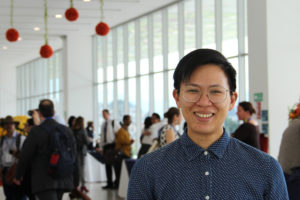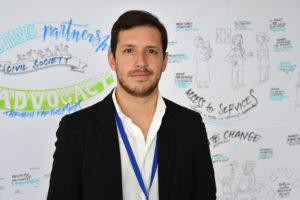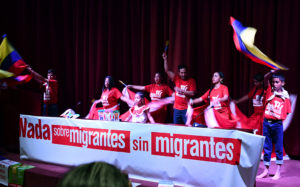Civil Society Coordination
ICMC played a leading role globally to amplify civil society voices through agreed priorities and strategies and joint advocacy to governments and international organizations. In doing so, ICMC ensured diversity and fair representation of migrants, refugees and grassroot organizations on the global stage

GFMD Quito Summit
The ICMC-coordinated Civil Society Day gathered 229 civil society delegates and nearly 60 government and other observers. Over 45 percent of the delegates were migrants, refugees or members of the diaspora.

February
The Action Committee, co-convened by ICMC, published the commissioned report, “Civil Society Models of Engagement in a New Era of Migration Governance.”

February
ICMC delivered a civil society statement to Friends of the Forum urging governments to cooperate to improve migrants’ lives worldwide and address negative migration narratives.

May
ICMC presented a civil society statement to Friends of the Forum underlining the need for States to agree on clear objectives, clear benchmarks and clear outcomes.

September
In a statement, ICMC updated Friends of the Forum on civil society preparations for the GFMD Summit in Quito and issues still needing addressing.

November
During the International Organization for Migration Council meeting, an ICMC statement highlighted the upcoming GFMD Civil Society Day’s focus on strengthening partnerships to implement the Global Compact for Migration.
Experimental Space for Change
Imagine a space where governments, business leaders, local authorities and civil society can have the frank conversations about migration that lay the foundation for real change in migrants’ lives. That space is the Global Forum on Migration and Development (GFMD), says Stéphane Jaquemet, ICMC Director of Policy.
Though the GFMD is not binding, governments usually are receptive to engaging with civil society representatives, notes Jaquemet, who heads up the GFMD Civil Society Coordinating Office. “It is a place where delicate migration issues can be discussed in an open and transparent manner.” And it’s an approach that brings in experiences from migrants themselves and organizations like ICMC who provide services at the grassroots level. Mayors and people from the business sector also are key contributors to the GFMD.
The idea is not necessarily to arrive at immediate results, according to Jaquemet. Rather, the GFMD is a laboratory – crucial for effecting longer-term change. “We must remember that the GFMD, created 13 years ago, paved the way for the adoption of the Global Compact for Migration.”
Working Together to Improve Migrants’ Lives
2019 saw the dawning of a new era in global migration governance. Some 160 UN Member States adopted the landmark Global Compact for Safe, Orderly and Regular Migration (GCM) in December 2018, and the focus shifted from negotiations to implementation.
ICMC played a central role coordinating civil society engagement throughout this pivotal year. This resulted in civil society spotlighting crucial issues as the GCM moved to the action phase. At the top of the agenda: climate-induced displacement, access to services for all migrants, mixed migration and the criminalization of migrants and those assisting them.
ICMC supported the leadership of key global platforms that enabled civil society to strengthen partnerships with governments and other actors. By working together more closely, civil society is contributing to make the GCM a living document to improve the lives of migrants and communities.
Global Platform for Collective Action
The Civil Society Action Committee, a 35-member NGO advocacy coalition co-convened by ICMC, entered a new phase in 2019. Its original mandate to facilitate civil society advocacy around GCM negotiations was extended to focus on civil society engagement during the implementation of the Compact.
Thus, last year the Action Committee offered civil society a space to develop collective strategies to ensure that governments were implementing the GCM in good faith, in particular through joint projects and partnerships with grassroots organizations on specific issues.
The Action Committee began engaging with the UN Migration Network, a grouping of 38 UN agencies created in 2018. The network strives to create synergies among UN migration-related programs and provide support and resources to governments to implement the GCM.
The Action Committee contributed to linking policy with realities on the ground as the UN Migration Network coordinated development of a proposal to implement the GCM in the Northern Triangle of Central America. Civil society was able to offer its knowledge of directly assisting migrants to the governments of El Salvador, Guatemala, Honduras and Mexico as they look to enact best practices to respond to mixed migration in the region.
Last year, the Action Committee also played a bridging role between the GCM, the Global Compact on Refugees and the GP20 Plan of Action. The latter, launched in 2018, is a multi-stakeholder initiative to address and prevent internal displacement.
In light of new migration governance realities, the Action Committee launched a consultative process looking at new models of civil society engagement. As part of a global civil society platform, Action Committee members and partners have committed to information-sharing on migration policy and governance, collective action, partnerships with governments to improve the lives of migrants and more inclusive and diverse possibilities of engagement.
Laboratory for Transformation
ICMC coordinated civil society participation in the Global Forum on Migration and Development (GFMD) throughout 2019 as the GCM focus shifted to implementation. A government-led space for collaborative discussion and innovative solutions around migration, the GFMD was instrumental in paving the way for the GCM.

Not Just a “Global South” Issue
When it comes to climate change affecting migration, the bottom line is that moving should be a free choice, says GFMD participant Kayly Ober. If people decide to move, they should be able to do so safely. And they shouldn’t be forced to migrate because the natural environment is no longer safe or doesn’t enable them to earn a living. The senior advocate and program manager of Refugees International’s Climate Displacement Program believes that migration governance needs to reflect that climate change can have as life-threatening an impact as persecution or situations of violence. For Ober, climate change is a moral issue challenging people all over the world.
ICMC acted as spokesperson for civil society at three Friends of the Forum meetings that brought together GFMD stakeholders in February, May and September. On behalf of civil society organizations, ICMC urged governments, local authorities, business leaders and civil society in its diversity, including migrants themselves, to work together in the interest of migrants, ensuring in particular that all migrants, regardless of status, have access to basic services. ICMC Director of Policy Stéphane Jaquemet underlined the need for long-term engagement of all governments. He called for concrete recommendations for implementation based on the roadmap agreed during the GCM adoption process.
Civil society advocacy culminated at the GFMD Summit held in Quito, Ecuador, in early 2020. The global “laboratory” on migration and development gathered more than 1000 representatives from governments, the private sector, civil society organizations and, for the first time, city mayors. Implementation of the GCM was front and center on the agenda, as delegates took stock of national and regional initiatives since the landmark framework was adopted.
ICMC coordinated the GFMD Civil Society Day, dedicated to deepening “Civil society’s contribution to transforming global migration governance: Strengthening implementation and enrichening partnerships for migrants and communities.”
From the onset participants were reminded of the aim to put migrants and their realities at the heart of discussions. In table groups, the delegates explored how to strengthen partnerships to benefit migrants and their host communities. This included identifying best practices as well as challenges when providing vital services such as health and education.

Voice From the GFMD Host Country
Latin America welcomed the GFMD Summit for the first time this year – in Ecuador, a country of origin, transit and destination for migrants. It has provided a refuge for Colombians on the move and, more recently, Venezuelans. The Summit was an opportunity for local civil society actors to share experiences, address stereotypes and get a closer look at what had – and hadn’t – worked in meeting migration challenges in other places. “We can’t do ‘business as usual’ anymore,” says Daniel Almeida, Latin America Regional Advocacy Advisor for Care International, who sees the Forum’s space for dialogue as invaluable in effecting change.
The Civil Society Day discussions centered on five themes drawn from the civil society’s ten commitments towards migrants and refugees adopted in Marrakech in December 2018:
- Access to services for all migrants
- Mixed migration movements
- Labor migration
- Climate-related displacement
- Criminalization of migrants and those assisting them
In joint advocacy messages, the civil society delegates called attention to issues not addressed, or inadequately addressed, by the GCM – including climate change-related displacement and the criminalization of migrants and those assisting them.
With regard to climate change and migration, civil society organizations urged caution in the use of data. Focusing on displacement numbers risks shifting attention away from climate change as a root cause of migration. The experiences of communities affected by climate change need to inform policy.
Seeking to end the criminalization of migrants and those assisting them, civil society representatives insisted that human values and rights must be upheld. Narratives are crucial since language such as “illegal” rather than “irregular” paves the way for discriminatory or harming policies like detention. Civil society delegates also noted that sanctuary cities offer specific alternatives to criminalization.
The Civil Society Day brought these recommendations to the Summit’s Common Space, which was open to all GFMD Summit participants for the first time ever.
ICMC coordinated two thematic sessions at the Common Space session between governmental and civil society representatives. Session participants took up the question of narratives on migration and migrants as they explored better inclusion of migrants in host communities. The delegates exchanged experiences of shaping narratives and combatting xenophobia – both challenges and good practices.
“Very often civil society organizations or parishes are the first entry points for migrants which means they are very close to them and hear all their worries.” — Dr. Hildegard Hagemann, German Bishops’ Conference Commission Justitia et Pax, speaking at the GFMD Quito Summit
Member's story
The Church’s Outcry of Welcome
A political, social and humanitarian crisis since late 2015 has driven some 1.5 million Venezuelans to seek refuge in Ecuador, a country of 16.6 million. Though many continue on to Peru and Chile, about 400,000 have stayed.
Faced with this migratory crisis, the local Church has taken up Pope Francis’ call to welcome, protect, promote and integrate people on the move.
“When we saw that Venezuela was coming apart at the seams, we started to meet and to ask ourselves what we could do as a Church,” says Fr. José García, Executive Secretary of Caritas Ecuador. “We began sharing our experiences of working with migrants and also invited other congregations to join us.”

Enter Red CLAMOR – the “Outcry” Network, formed in March 2017 at the initiative of the justice and solidarity arm of the Latin American Episcopal Council (CELAM). CELAM invited Catholic-inspired institutions in 23 countries throughout Latin America and the Caribbean to come together to respond to the needs of uprooted people. Several ICMC national member Episcopal Conferences are active in this CELAM-supported ministry.
In Ecuador Red CLAMOR has focused on accompanying Venezuelan migrants and refugees. Welcome in the form of shelters across the country offer a place for vulnerable, newly arrived migrants to rest and consider next steps. Each shelter’s welcome is unique, from a school modified to house families to a house donated by Marist Brothers for men on their own.
Red CLAMOR’s judicial branch is working to ensure that people’s fundamental right to seek protection, enshrined in the Ecuadoran constitution, is respected. Network members also distribute materials locally that tell migrants’ stories and put a human face to their realities.
Just ahead of the Global Forum on Migration and Development (GFMD) in Quito, the Network organized an alternative forum, “Nothing About Migrants Without Migrants,” for migrants in Ecuador to share their experiences. Their calls to action – in particular to integrate international human rights principles into migration policies and include uprooted people at decision-making tables – informed civil society advocacy at the Forum.
To promote acceptance, Red CLAMOR member Caritas Ecuador is supporting migrants’ entrepreneurial initiatives. And parishes throughout Ecuador are extending a welcoming hand to help the newcomers from Venezuela, the majority Catholics, integrate into their host communities.
“In many parishes, we are making sure that Venezuelans feel that they are at home,” says Fr. García. This can mean inviting migrants to mass and introducing them to fellow parishioners, as well as connecting them with migrants who have been in the country longer and can give extra support.

